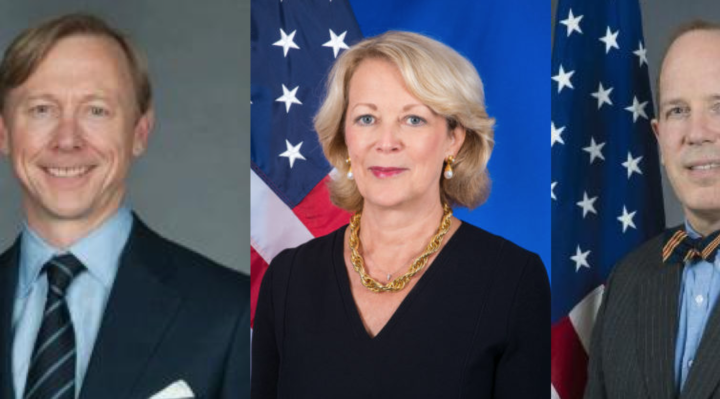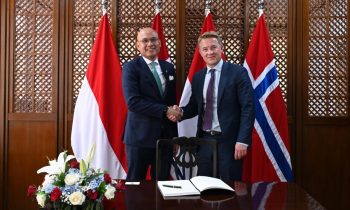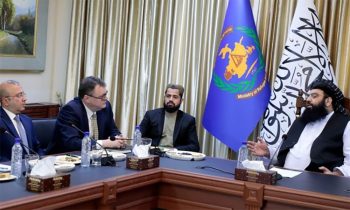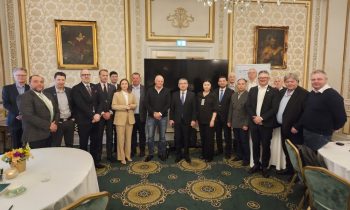The United Nations’ atomic watchdog agency has called on Iran to provide inspectors access to sites where the country is thought to have stored or used undeclared nuclear material.
The American representative, Jackie Wolcott, said the US had supported the resolution and that the ball was now in Iran’s court.
“The fact of the matter is this is entirely Iran’s decision,” she said in a conference call with reporters. “They could fix this overnight if they would just decide to comply with their obligations with the IAEA.”

Below is a full rush transcript of the press conference with Brian Hook, U.S. Special Representative for Iran and Senior Policy Advisor to the Secretary of State, Ambassador Jackie Wolcott, U.S. Representative to the Vienna Office of the United Nations and to the International Atomic Energy Agency (IAEA), and Dr. Christopher Ford, Assistant Secretary, Bureau of International Security and Nonproliferation.
Mr. Hook: The news out of Vienna is significant and raises very serious concerns about Iran’s nuclear program and lack of transparency. The IAEA announced that for nearly a year, Iran has refused to answer the IAEA’s questions about multiple locations related to its past nuclear program. Yesterday Foreign Minister Zarif tweeted that Iran has nothing to hide. If only that were true. The truth is, it seems that Iran does have something to hide. This is why, for almost one year, Iran has refused to answer the IAEA’s questions and is now denying inspectors access to potentially sensitive nuclear sites. If Iran really has nothing to hide, then it should have no problem granting full access to IAEA inspectors.
This all comes down to Iran upholding its commitments under international law. Iran is legally obligated to permit the IAEA to access sites that it deems necessary to inspect. This commitment arises from Iran’s obligations under the Nonproliferation Treaty and its safeguards agreements. Iran has a choice: it can answer the IAEA’s questions and comply with the fully legitimate requests for access, let inspectors travel freely, and be transparent about its activity; or it can continue to take its current path of stonewalling and deception. This, however, will only increase Iran’s diplomatic isolation. All NPT signatories – all of them, including Iran – have an obligation to uphold their commitments under the NPT. There are no exceptions.
We are pleased that the IAEA Board of Governors passed a resolution making clear that Iran must answer the IAEA’s questions and provide it full access and cooperation. I want to especially thank our European partners, including the UK, France, and Germany, for the leadership role they played in getting this resolution passed.
Russia and China, unfortunately, tried to shield Iran from scrutiny. As nuclear powers, China and Russia have special responsibilities not to support nations who play cat and mouse with the IAEA. Their votes were irresponsible and the international community deserves better.
As nearly all nations will attest, the IAEA has handled this issue with skill and competence. The United States continues to have full faith and confidence in the professionalism and independence of the IAEA. President Trump is committed to ensuring that the Iranian regime never develops a nuclear weapon. The United States will continue to work with countries around the world to hold Iran to its international commitments.
It is worth reminding everyone that just last month, Iran’s supreme leader endorsed Hitler’s “Final Solution.” Iran regularly threatens to wipe Israel off the map. A regime like this, which threatens to annihilate another nation, should never be allowed to obtain the means to do so. The United States will never let this happen.
I will now turn it over to my colleague, Dr. Ford, and then to Ambassador Wolcott, to update you on her team’s great efforts in Vienna to hold Iran accountable.
Dr. Ford: I’d like to emphasize just how significant this juncture is at the IAEA. For those of you who follow Iran policy, for the last several years you will of course have been following that almost all debate in public has gone back and forth about things such as the merits and demerits of the JCPOA nuclear deal. I think a lot of people got comfortable with that being the sort of set of Iran proliferation-related issues. But while everyone was focusing upon the JCPOA, new problems have in fact arisen now on the traditional safeguards front, which is quite a different question.
For the first time since the JCPOA was agreed in 2015, we now have the prospect of Iranian safeguards problems looming. There is evidence of potential undeclared nuclear material and/or activity being hidden in Iran. This is the first time that’s happened since the JCPOA was agreed, and it is the first time ever that any country anywhere in the world has refused a request for access and information under the IAEA’s Additional Protocol.
This is actually quite a game-changer. It means that whatever disagreements the countries of the world may still have about the JCPOA, the whole world has an interest in coming together to protect the integrity of the global system of IAEA safeguards that everyone has relied upon for generations to detect the diversion and prevent the diversion of nuclear material to weapons purposes.
As Director General Grossi’s report of June 5 makes quite clear, for the last four months Iran has refused IAEA inspectors access to two locations that the IAEA believes may relate to undeclared nuclear material or activity in Iran.
As the director general has also reported, at one of those sites, since July of last year, there has been activity that looks rather like sanitization of the site. It looks, in other words, as if Iran is hiding evidence while it delays giving access to the IAEA, in contravention of its obligations. As the DG’s report also notes, for over a year now Iran has failed to resolve IAEA questions about possible undeclared nuclear material and activities shown by environmental sampling potentially exist at another location that was not declared to the IAEA.
So it’s hard to overstate the significance of this. First of all, we have evidence of possible undeclared nuclear material and activity in Iran at multiple locations; and secondly, Iran has denied access in the first-ever repudiation of a country’s obligations under the safeguards agreement and the IAEA Additional Protocol. This is a huge thing, and I’m glad that the board now – this makes it extremely important that the Board of Governors in Vienna has now spoken. This is not just an Iranian proliferation threat but it is a threat to the integrity of the system of global safeguards that we all rely upon.
So I would say that congratulations are in order to the IAEA Board of Governors. It is a courageous and important thing that it has now spoken up to join the director general in expressing serious concern about these problems, and insisting that Iran live up to its obligations by providing full cooperation without any further delay.
I think it’s a very important day and it’s a thing that we should all be proud of in the Board of Governors that our countries have passed a resolution making these critical points so clearly.
Ambassador Wolcott: This morning, as mentioned, the IAEA Board of Governors adopted a resolution calling on Iran to cooperate without further delay regarding possible undeclared nuclear material and activities. As we explained to the board today, we welcome the adoption of this resolution, which reaffirms the fundamental importance of Iran fully implementing its safeguards obligations without further delay.
In the resolution adopted today, the board made clear why this was a necessary step at this time, echoing the director general’s serious concern regarding Iran’s denial of access and refusal to substantively engage to address the agency’s questions about possible undeclared nuclear material and activities in Iran today. The board’s resolution demonstrates the seriousness with which it views Iran’s dubious distinction as the first state ever to prompt a report to this board that it is denying complementary access under the Additional Protocol. This resolution has also made clear the board’s expectation about next steps, calling on Iran to fully cooperate with the agency and satisfy the agency’s requests without any further delay, including by providing prompt access to the locations specified by the agency.
We hope Iran will take a clear warning from this resolution. It must immediately uphold its safeguards obligations. This is no longer business as usual. This matter has entered a new phase and the board has made clear Iran must comply. We hope they will.
In addition, I would like to reiterate what Special Representative Hook said regarding the IAEA. We have full faith in the IAEA and its highly skilled and professional inspectors to carry out their critical verification and monitoring responsibilities in Iran. The board today made clear it shares this confidence and support. We’re committed to working through the IAEA Board of Governors to provide the IAEA the support it needs to resolve these very serious matters.
Question: What, in your opinion, are the meaning of the Chinese and the Russian rejection of the resolution and voting against it? Is it just a spoiling activity, or Russia and China have some special benefits from protecting Iran from international attention?
And my question to Ambassador Wolcott: What are next steps? Because now we already know that Tehran rejected the resolution and promised not to allow inspectors to visit these locations. So what next?
Mr. Hook: On the first question, Russia and China should show more concern for protecting the mission of the IAEA than protecting the Islamic Republic of Iran. And as to their motives, I would – that’s really a question for them.
Ambassador Wolcott: I think the board made clear today its role and sent a clear statement, and really the next step is Iran’s. Iran must provide the cooperation and the access that it needs from the IAEA. And as I mentioned, we’re entering a new phase, and we’ve made clear that Iran must comply with its safeguards obligations. So I think we’ll be watching very carefully in the next days and weeks what Iran is going to do to comply with its obligations.
Question: I have two brief points, first to Ambassador Wolcott. What international rule you referred to that could force Iran to be committed to a treaty, more or less, that the U.S. unilaterally canceled? I don’t understand the circumstances so far.
And then the second point is to Dr. Ford. In a more general sense, because you mentioned Israel, why people should be more afraid of the eventual nuclear weapon that is – could be developed in Iran rather than being afraid of the existing Israeli nuclear weapons?
Dr. Ford: You asked about trying to force Iran back into the JCPOA. This has nothing to do with forcing Iran back into the JCPOA. That was actually part of my point. This is a safeguards problem, not a JCPOA problem. It’s an entirely separate question. It arises out of legal obligations that Iran has undertaken under its Comprehensive Safeguards Agreement and the Additional Protocol to the IAEA. It’s required to have safeguards arrangements with the IAEA by the Nuclear Nonproliferation Treaty. So you have a complex of legal obligations upon Iran under the NPT’s Article III, and under the safeguards agreement, and under the Additional Protocol, all of which require that Iran cooperate fully with the IAEA when the IAEA’s authorities – when the IAEA, using its authorities, feels that there is a question that needs to be resolved. In this case that is exactly what has happened.
So the question here has nothing to do with the JCPOA and nothing to do with, well, any other country except Iran and its relationship to the international rule of law. If we believe that IAEA safeguards are important and need to be protected, we absolutely must stand together and voice our full-throated support for the agency’s use of its authorities and to demand that IAEA access be given by Iran. This is not about any of those other issues. This is about the integrity of the international system and whether we are all willing to stand with the International Atomic Energy Agency as it does its professional job.
Ambassador Wolcott: I was just going to add one thing. This – it’s very clear in these circumstances, as Chris said, this is about safeguards. And the fact of the matter is this is entirely Iran’s decision. They could fix this overnight if they would just decide to comply with their obligations with the IAEA.
Question: In your statement, the U.S. preferred to have stronger words in the draft. Can you elaborate more on this point, please? Does the U.S. wish that the urgency and the critical nature of Iran’s noncompliance be stressed?
Ambassador Wolcott: Thank you. So the text of the resolution we adopted today is, we think, a balanced text and it was meant to attract as broad a support as possible, which of course it did get our support. And our objective was the clearest possible statement of just how essential to the integrity of safeguards Iran’s denial of access and refusal to cooperate are. We thought the resolution could have been a little even more direct in expressing that sentiment, and in particularly in particular on laying out its commitment to act if Iran continues to ignore its obligations. But as I said, we think this was a very good step, it had broad support, and it makes clear that the board is supporting the IAEA in calling upon Iran to fulfil its commitments.
Dr. Ford: The sort of phrasing that we prefer is the sort of phrasing – ideally is the sort of phrasing that we use routinely in statements at the Board of Governors, in all sorts of public fora, and by our Secretary of State himself. But we voted for this resolution because it’s a clear and a necessary statement that joins the director general in expressing serious concern and calling on Iran to cooperate fully with the agency without any further delay. That’s a – it’s a very important step and it was a very easy thing for us to support.
Question: It’s a quick clarification point. Both Ambassador Hook and Secretary Ford referred to, quote /unquote, “multiple locations,” whereas it was reported that it’s only two sites, as far as I remember. So are we talking about more than two? Could you clarify this? And Ambassador Hook, if I could ask you to update us on your reaching out to the Iranians. Have you succeeded in getting their agreement to maybe meet or just discuss this over the phone, anything on that?
Dr. Ford: Sure. What I said was that there is now evidence of potential undeclared nuclear material or activity at multiple locations in Iran. There are two locations to which the IAEA has requested access, and there is an additional location at which environmental sampling found evidence of uranium particles, suggesting the potential presence at some point of undeclared material or activities there, and that’s the one about which the IAEA has been trying for over a year to get answers from the Iranians, so far to no avail. So that would be three sites at which evidence has come forward to suggest the possibility of such undeclared nuclear material or activity.
Mr. Hook: To answer the second question that you raised, we have successfully reached agreement with the Iranian regime twice on detainee issues. It is true that I have requested an in-person meeting with the regime to discuss the Americans who are still being wrongfully detained in Iran and which includes the Namazis and Morad Tahbaz, and also the return of the remains of Bob Levinson. This is really a question for the regime at this point, since we have clearly stated our intention.
Question: I think it was around 2003 and 2009, there were no fewer than seven resolutions calling on Iran to cooperate by the IAEA board, all of which passed unanimously, as if memory serves, and in this case you had two no-votes which I believe were not. Perhaps you could address this, but my understanding was at least the secretariat were hoping for a more or less unanimous agreement. And you had eight extensions, which is quite – considered quite high. Would you say that you’ve done enough to try to get unanimity on this? I mean, when you’re asking a member state to cooperate, it’s generally considered a much stronger outcome if you get everyone on board, but that did not happen in this case. So could you speak to that, please?
Dr. Ford: I would say that on its merits, this was a very easy case. The resolution is balanced and clear. It echoes the professional findings of the IAEA secretariat and it indeed would have been better had everyone supported, as indeed they should have. What’s interesting in some respects here is that we – what we now see is something of a falling out between the remaining participants in the JCPOA, with Russia and China now clearly showing their status as protectors and enablers for Iranian proliferation threats and safeguards problems. That’s now clear and out in the open. I wish it weren’t that – I wish they weren’t playing that role. It’s very unfortunate that they have opted to do that. What we see in the voting patterns is a result of the choices they have been making to protect and enable Iran’s misbehavior.
So while I regret that they play that role, I guess I don’t regret so much that at least it is now clear that they are playing that role in public, because there has been a pretense otherwise for some time. And so now at least it is clear what the state of play really is, and I still think we have been very successful in showing a strong basis of support by the international community for doing the right thing and insisting upon the integrity of the IAEA safeguards system. And if there are countries that are not willing to join in protecting the IAEA’s integrity, and the integrity of global safeguards, well, shame on them.
Question: Can you elaborate at all on what next steps might be viewed as necessary or as possible by the U.S. and its allies? I mean, would you take a referral of this issue to the UN Security Council off the table, for example?
And then another question for Special Representative Hook. We’ve heard some discussions about what might happen in terms of the arms embargo which, if I understand correctly, as part of the JCPOA, from this autumn would be progressively lifted and there have been reports in other media that sort of a compromise might be considered whereby there would be a partial, time-limited extension of this embargo. Is that something that the U.S. is currently considering?
Ambassador Wolcott: Iran – it’s really in Iran’s court. They need to give the cooperation and access that’s required. I would say the way we look at it is they shouldn’t look at this, today’s board meeting closing, as a free pass until September. They tend to think they – wow, they just got through another board and three months will go by and they’ll have a pass. But I don’t think that’s the case. I think in Vienna and with the secretariat and the director general, it’s clear that there’s been too much time – there’s been months; some of these issues have gone on for almost a year – and that if they don’t promptly act, then the board will have to consider next steps.
Dr. Ford: I think just to remind everyone that the real question here is what, if anything, are the Iranians hiding? If they’re hiding nothing, then there’s no reason this issue cannot be easily resolved and quickly go away as a safeguards problem. That would be it’s clearly the best solution. So if they’re not hiding anything, then great, let’s be done with this problem. It’s so and that’s why it’s up to Iran what the next steps really are. The longer that they act as if they are hiding something significant, the more seriously the rest of the world will absolutely have to take this situation. But it’s up to them how serious this situation appears.
Mr. Hook: We have drafted a resolution that would extend the arms embargo on Iran which is set to expire on October 18th of this year. The last thing the Middle East needs is more conventional weapons for Iran to use to attack other countries, as it did to Saudi Arabia, or to funnel weapons to its proxies around the Middle East. And so we think that for those nations who care about a more peaceful and stable Middle East, it is imperative that the arms embargo get extended. It was a mistake to include it, to allow it to expire in year five of the deal. This is the first of many expirations that will take place under the Iran nuclear deal because the Iran nuclear deal is temporary. It expires, and it starts to expire in just a few months. This is the first significant expiration, and the international community needs to support extending the arms embargo. No one can argue that Iran’s behavior since 2015 merits a lifting of the arms embargo. And so that is our position. I don’t have any observations to make about what you referenced in terms of compromises. Our position is the arms embargo needs to be extended.
Dr. Ford: On my part , just to reiterate what my colleagues have expressed before, and that is our strong support for the IAEA, for its mission, for the professionals in its safeguards department and for its director general, who are here doing their job as the international community needs and requires them to do. They’ve been doing a commendable job of it. They deserve our continued support and we’re very proud that we could join with so many other members of the IAEA Board of Governors in a resolution expressing strong support for their mission and calling upon Iran to let them continue to do their job as we all need them to do.



